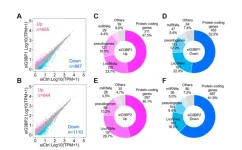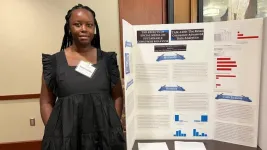(Press-News.org) There’s one question that Hollings Cancer Center researcher Jennifer Dahne, Ph.D., co-director of the remote and virtual trials program at the South Carolina Clinical & Translational Research Institute, hears more than any other as she consults with clinical researchers about how to set up remote trials, also known as decentralized trials. Will these trials overcome the barriers that make it difficult for minority and underserved populations to participate in clinical trials? It’s also a question she often discusses with her peers at other academic medical centers that are also home to Clinical and Translational Science Award hubs.
Dahne thinks it’s too soon to give a definitive answer to that question. She argues in a recent Journal of the American Medical Association Viewpoint article and in the following Q&A that rigorous evidence is lacking as to how these trials affect the diversity of clinical trial enrollment.
Q: Can you describe what a decentralized trial is?
A: Decentralized trials bring clinical research opportunities to participants where they are rather than bringing participants to clinical trial sites, as in the traditional model. This approach aims to improve access to clinical trials and to make it easier for patients to participate in them.
Q: What excites you most about a decentralized approach to trials?
A: Like many others, I believe this approach has promise for making our trials more accessible to populations of patients or research participants who typically wouldn't participate. We know that there are disparities between who enrolls in our clinical trials and who is burdened by the diseases that we study. The potential to make our trials more accessible, and by extension improve the generalizability of our results, is the thing that really excites me the most.
Q: What advice would you give to researchers eager to make decentralized trials the cornerstone of their clinical trial diversity initiatives?
A: We assume that pivoting to decentralized trials will increase access to clinical research for minority and underserved populations, but we need to take a critical look at the methods and procedures of these trials and see if they are having the desired effect.
Although these trials may overcome geographic barriers, they may come with their own unique barriers.
For example, Black and Hispanic people have considerably lower rates of home broadband internet access than White people in the U.S., and there is also a clear association between annual household income and home broadband internet. Likewise, only 61% of adults 65 and older own smartphones as compared to 95% of those between the ages of 30 and 49, perhaps making it more difficult for them to participate in these trials. Older adults might also have dexterity or perceptual issues, such as vision or hearing impairment. Those could also be major barriers to participating in trials that require regular use of technology.
It is also possible that this type of trial design could worsen other known barriers to participating in clinical research, such as mistrust of academic institutions and of clinical research. What is the impact of a shift to these methods on trusting academic research? With less direct contact between participants and researchers, would clinical researchers have fewer opportunities to dispel that mistrust? And how does that differ across various patient populations? We just don't know yet.
We've learned in many other areas of medicine how costly it can be to roll back interventions when we realize they are not having the intended effect. Now that the COVID-19 pandemic is waning, we have the opportunity to be very thoughtful about how we move forward with remote trials to avoid such a costly mistake – one that can’t easily be undone.
Q: How can we get definitive answers?
A: We need rigorous randomized controlled trials that compare traditional in-person clinical trial methods to decentralized trial methods. It will be important to evaluate the impact of these different types of clinical trial methods on trial enrollment across various patient demographic groups as well as on other aspects of the clinical trial pipeline. What is the pace of enrollment? What about the cost of the study? What about the validity of the data that's collected? It will be important to have these rigorous randomized controlled trials to answer questions about the impact of this new approach across every step of the clinical trial pipeline.
The National Center for Advancing Translational Science recently issued a request for information to get input on critical issues around decentralized trials. My hope is that there will be increased interest and a push, particularly from funding agencies, to answer these sorts of questions.
# # #
About MUSC
Founded in 1824 in Charleston, MUSC is the state’s only comprehensive academic health system, with a unique mission to preserve and optimize human life in South Carolina through education, research and patient care. Each year, MUSC educates more than 3,200 students in six colleges – Dental Medicine, Graduate Studies, Health Professions, Medicine, Nursing and Pharmacy – and trains more than 900 residents and fellows in its health system. MUSC brought in more than $298 million in research funds in fiscal year 2022, leading the state overall in research funding. MUSC also leads the state in federal and National Institutes of Health funding, with more than $220 million. For information on academic programs, visit musc.edu.
As the health care system of the Medical University of South Carolina, MUSC Health is dedicated to delivering the highest-quality and safest patient care while educating and training generations of outstanding health care providers and leaders to serve the people of South Carolina and beyond. Patient care is provided at 16 hospitals (includes owned and equity stake), with approximately 2,700 beds and four additional hospital locations in development; more than 350 telehealth sites and connectivity to patients’ homes; and nearly 750 care locations situated in all regions of South Carolina. In 2022, for the eighth consecutive year, U.S. News & World Report named MUSC Health University Medical Center in Charleston the No. 1 hospital in South Carolina. To learn more about clinical patient services, visit muschealth.org.
MUSC has a total enterprise annual operating budget of $5.1 billion. The nearly 26,000 MUSC family members include world-class faculty, physicians, specialty providers, scientists, students, affiliates and care team members who deliver groundbreaking education, research, and patient care.
About the SCTR Institute
The South Carolina Clinical & Translational Research (SCTR) Institute is the catalyst for changing the culture of biomedical research, facilitating the sharing of resources and expertise and streamlining research-related processes to bring about large-scale change in clinical and translational research efforts in South Carolina. Our vision is to improve health outcomes and quality of life for the population through discoveries translated into evidence-based practice. To learn more, visit https://research.musc.edu/resources/sctr.
END
More evidence needed to confirm promise of remote or decentralized trials
2023-06-01
ELSE PRESS RELEASES FROM THIS DATE:
Forest birds with short, round wings more sensitive to habitat fragmentation, OSU study shows
2023-06-01
CORVALLIS, Ore. – Tropical forest birds, which tend to have wings that are short and round relative to their body length and shape, are more sensitive to habitat fragmentation than the long-, slender-winged species common in temperate forests, according to an international collaboration that included scientists from Oregon State University.
OSU’s Matt Betts and Christopher Wolf teamed with 14 other authors to analyze the wings of more than 1,000 species worldwide in a study led by Thomas Weeks of Imperial College London and ...
Astrophysicists confirm the faintest galaxy ever seen in the early universe
2023-06-01
Key takeaways
After the Big Bang, the universe expanded and cooled sufficiently for hydrogen atoms to form. In the absence of light from the first stars and galaxies, the universe entered a period known as the cosmic dark ages.
The first stars and galaxies appeared several hundred million years later and began burning away the hydrogen fog left over from the Big Bang, rendering the universe transparent, like it is today.
Researchers led by astrophysicists from UCLA confirmed the existence of a distant, faint galaxy ...
Stress granules control Alzheimer's gene transcripts and neuronal proteostasis
2023-06-01
“Determining the mechanism underlying RNA sequestration in [stress granules] [...] could represent a key goal in the discovery and development of suitable [Alzheimer’s disease] biomarkers and therapies.”
BUFFALO, NY- June 1, 2023 – A new research paper was published on the cover of Aging (listed by MEDLINE/PubMed as "Aging (Albany NY)" and "Aging-US" by Web of Science) Volume 15, Issue 10, entitled, “Stress granules sequester Alzheimer’s disease-associated gene transcripts and regulate disease-related neuronal proteostasis.”
Environmental and physiological stresses ...
MU textiles professor earns grant as part of USDA’s Higher Education Challenge
2023-06-01
When you think about big data and fashion, it seems unlikely that the two might be stitched together. However, the modern fashion industry depends on data analytics throughout the supply chain to serve customers in ways that champion innovation, including expanding designers’ creativity, calculating the environmental impact of making a product and keeping brands up to date on changes in the market.
In an inventive project funded by a Department of Agriculture (USDA) grant of $149,000 awarded to Li Zhao, a professor of textiles and apparel management in the University of Missouri’s College of Arts and Science, students will ...
Deep-brain stimulation during sleep strengthens memory
2023-06-01
While it’s known that sleep plays a crucial role in strengthening memory, scientists are still trying to decode how this process plays out in the brain overnight.
New research led by scientists at UCLA Health and Tel Aviv University provides the first physiological evidence from inside the human brain supporting the dominant scientific theory on how the brain consolidates memory during sleep. Further, the researchers found that targeted deep-brain stimulation during a critical time in the sleep cycle appeared to improve memory consolidation.
The research, published June 1 in Nature Neuroscience, ...
School toolkits
2023-06-01
Children and young people naturally spend a large amount of their time at school, college or in other educational settings. Whilst most children with JIA are able to access education, many require adaptations or specific support to enable them to fully engage in learning. But families of children with JIA report lack of awareness and understanding, and believe that schools need special resources to be able to support these children and young people.
In the UK, Juvenile Arthritis Research (JAR) has developed a toolkit to allow teachers and school staff to confidently support children with JIA, and the initial rollout was assessed ...
Long-term risks of targeted therapies
2023-06-01
Janus kinase inhibitors (JAKi) and biologics are the cornerstone of modern treatment for rheumatoid arthritis (RA). But there have been concerns over long-term side effects. New data from a national healthcare database offer reassuring findings for overall cancers and cardiovascular disease (CVD).
Patients with inflammatory rheumatic diseases have an increased risk of CVD compared to the general population.1 In acknowledgement of this, EULAR – the European Alliance of Associations for Rheumatology – has published recommendations for cardiovascular risk management ...
Managing anxiety and depression in arthritis
2023-06-01
Anxiety and depression are the mental health issues most commonly associated with inflammatory arthritis, and it is well-established that there is a link between mental health issues and poor health outcomes.2 The EULAR recommendations emphasize the need to assess mental health regularly;1 however, little is known about the association between self-management and mental health in people with inflammatory arthritis.
At the 2023 EULAR congress, Vestergaard and colleagues report on their cross-sectional study in Denmark. This included 42,407 adult patients with rheumatoid arthritis (RA), psoriatic arthritis (PsA), or spondylarthritis (axSpA). The aim was to find ...
Healthy lifestyle and mortality in osteoarthritis
2023-06-01
In this work, data from the UK Biobank were used to investigate the association of both individual and combined healthy lifestyle factors with the risk of all-cause and cause-specific mortality among 104,142 people with osteoarthritis.
The researchers gave each person a score for their lifestyle, based on their body mass index (BMI) and self-reported diet, sleep duration, physical activity, sedentary time, social connection, smoking, and alcohol drinking – all factors thought to be associated with health.
Overall, there were 9,915 deaths recorded after the first 2 years’ ...
The European Alliance of Associations For Rheumatology, EULAR, announces its strategy for 2024 – 2028
2023-06-01
Over the period 2018 – 2023, EULAR, the leading organisation in RMDs, has grown substantially and has been professionalised in every aspect. For example, EULAR has increased its impact on RMDs through the development of new services provided by the EULAR Research Centre (ERC). Despite the disruption of routine procedures brought about by the pandemic, EULAR overcame the substantial associated challenges, providing continued access to education and networking for the RMD community. “We have made tremendous progress by setting up two virtual congresses and one fully hybrid congress, and we have ...




